Recovery after Maria
When? For Whom?
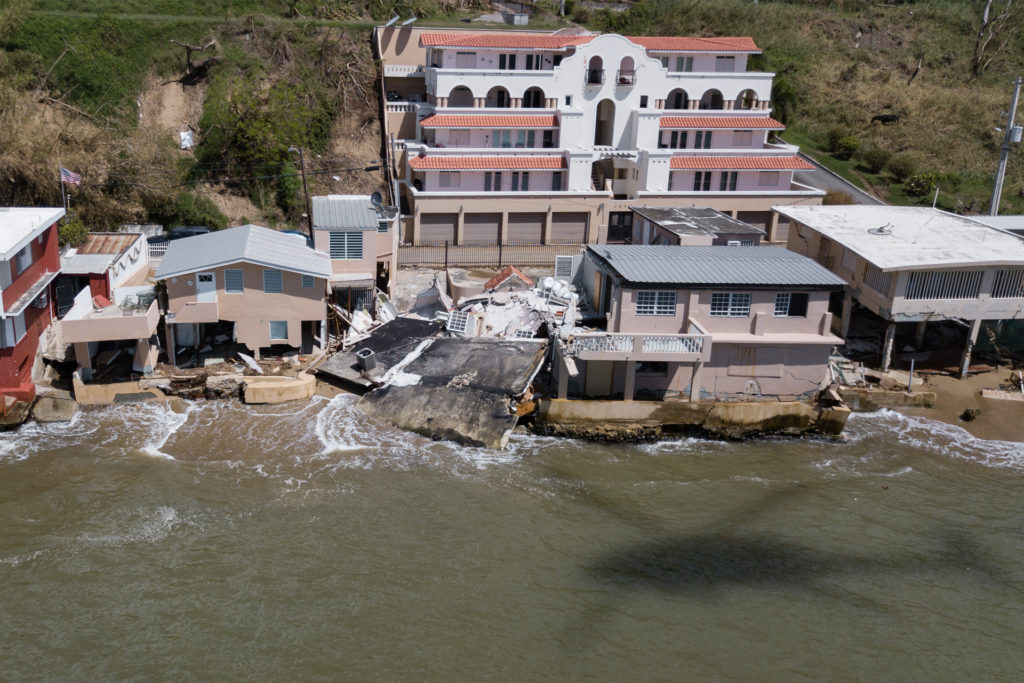
Urgent Proposals for a just recovery
There are dozens of proposals on the table.
These are a few of them.
For the Federal Government:
For the Government of Puerto Rico:
Three years after the most devastating hurricane in the history of Puerto Rico
Since Irma and Maria, Puerto Rico has been in the midst of a maelstrom of events whose effects keep accumulating. This has happened in the context of a 14-year economic recession, government austerity, an unpayable debt of $74.7 billion and decreasing political powers. The crisis is especially hard on those without access to dignified housing, the poor, and the most vulnerable.
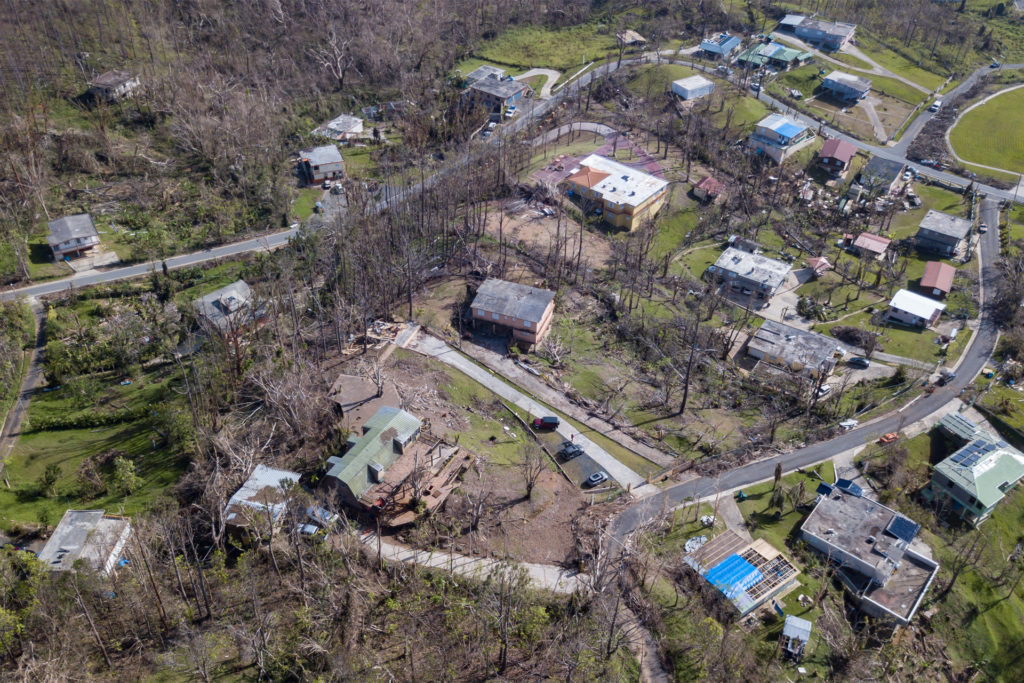
Thousands of families have had to face two tropical storms, eight months of seismic activity and a pandemic while living under blue roofs.
Many others live under unsafe and crowded conditions, in relatives’ homes or under eviction threats. Hundreds of thousands migrated, many of them after the earthquakes, due to a lack of solutions. Three years after Maria, recovery has not reached those most in need. Distrust in institutions prevails due to a governmental response that has been disorganized, slow and with few favorable results.
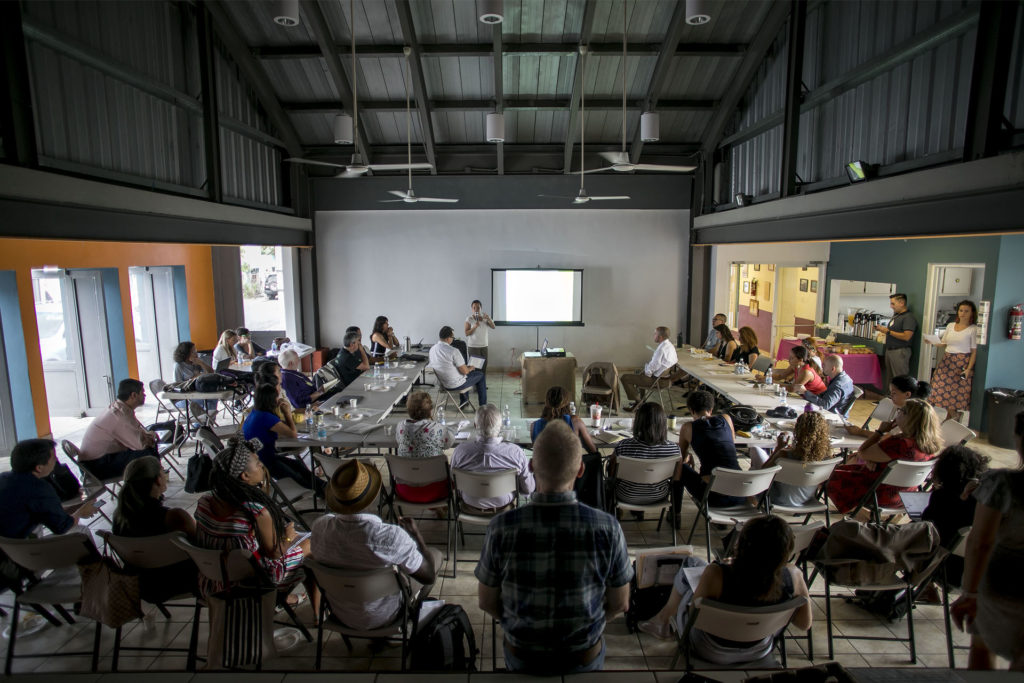
People have been doing everything in their power to meet their needs.
With limited resources and the support of humanitarian organizations, they have patched up their homes, raised renewable energy microgrids, community aqueducts, and turned abandoned buildings into homes. Instead of supporting and building upon these efforts, the State has adopted policies that undermine them, promote displacement and add to uncertainty.
It’s inconceivable that three years after Hurricane Maria, recovery plans taking into account community participation are not being implemented. Recovery must be aligned with a vision for the future: as a country, where shall we move towards from an environmental, social and economic sustainability perspective? ”
- Marina Moscoso, Centro para la Recuperación del Hábitat Tweet
The data speaks
From 1,138,843 individual assistance claims, FEMA approved 216,431 to support home repairs or replacements. (2)
However, through Tu Hogar Renace, the Puerto Rico Department of Housing (PRDOH) repaired 108,484 homes and some 15,000 roofs; and is now beginning construction of homes under CDBG-DR. (3)(4)
Vacant housing units in Puerto Rico in 2018. In 47 municipalities, average vacant housing units surpass 20% (2 in 10 units).(5)
Funds disbursed from the $45,937 million assigned by the federal government. $25,512 million have been obligated and, of these, $16,840 have been disbursed.(6)
Funds disbursed from the $20,223 million CDBG-DR/MIT assigned funds. From the $3,207 that have been obligated, $96 million (3%) have been disbursed.(6)
(1) Expressions by Puerto Rico Housing Secretary. https://www.miamiherald.com/news/nation-world/world/americas/article199948699.html
According to the article, local authorities have not updated the number of homes with blue roofs.
(4) https://fema.gov/fact-sheet/hurricane-maria-numbers
(5) (2018) US Census American Community Survey https://censo.estadisticas.pr/EncuestaComunidad
(6) https://recovery.fema.gov/state-profiles. Data up to July 31, 2020.
Ingredients for a just recovery
Just recovery is having the conditions that make it possible for people to stay in the country, that communities have what their members need, and that diversity is recognized.
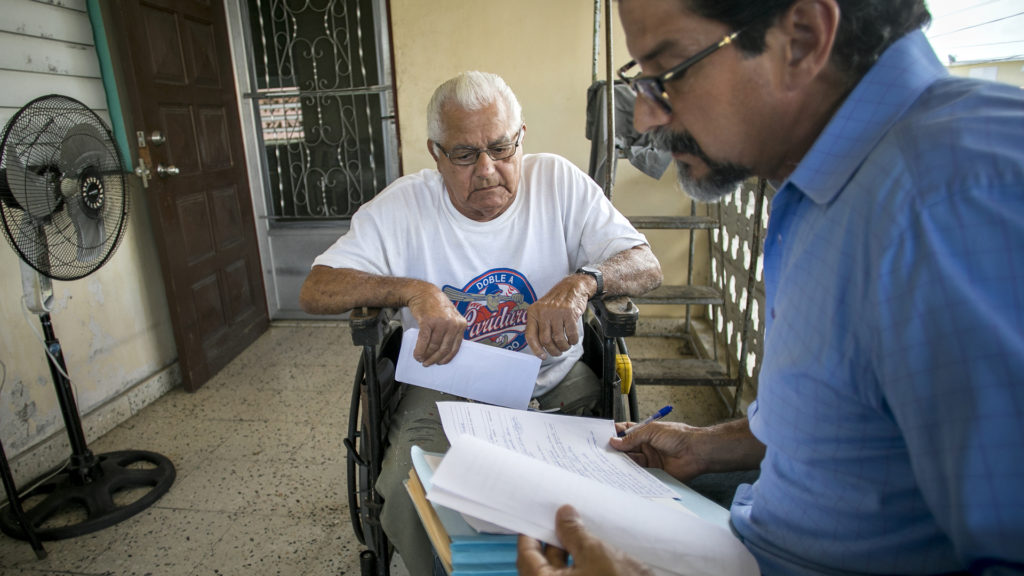
It is born out of civic participation in every process, accompanied by support and information. It requires access to resources, as well as the equitable and timely disbursement of funds.
The right to dignified housing is an essential part of a just recovery. It means living in peace, with the essentials to enjoy a happy life without fear of displacement. It is the right to have a safe home, with access to infrastructure and basic services, where privacy is respected. It is the right of people to choose their home and to remain in their communities.
The recovery process has benefited some sectors over others. Foreign contractors and consultants, tax incentives beneficiaries and political investors, among others, have been favored. Meanwhile, communities, owners and occupants without official documents, micro entrepreneurs, SME partners and workers, social organizations, people with functional diversity, homeless people, the elderly, immigrants, among others, have received very little, if anything. Puerto Rico has the highest inequality rate among all United States jurisdictions.
Just recovery requires addressing inequality and investing in the structure that starts with the community in mind.
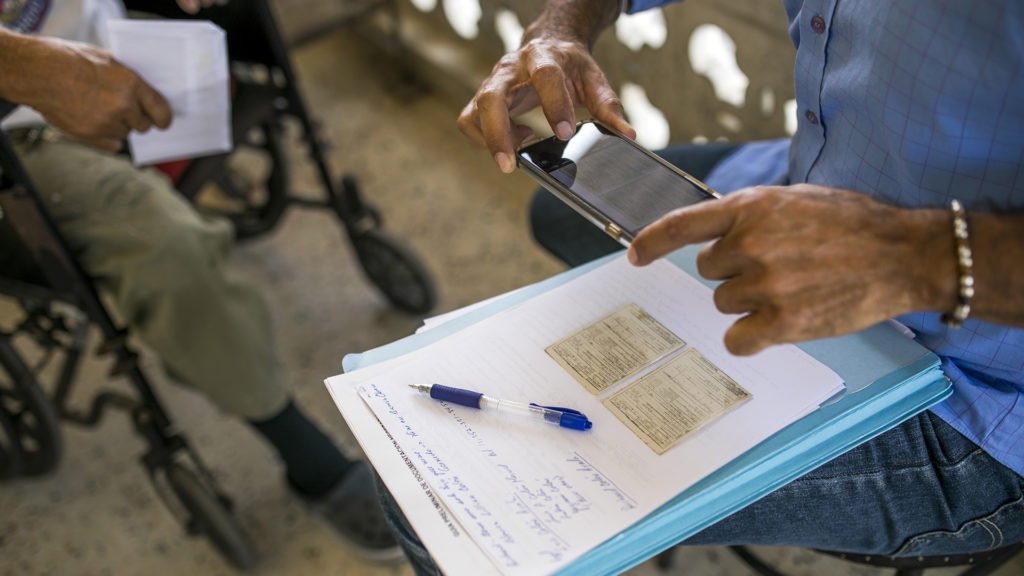
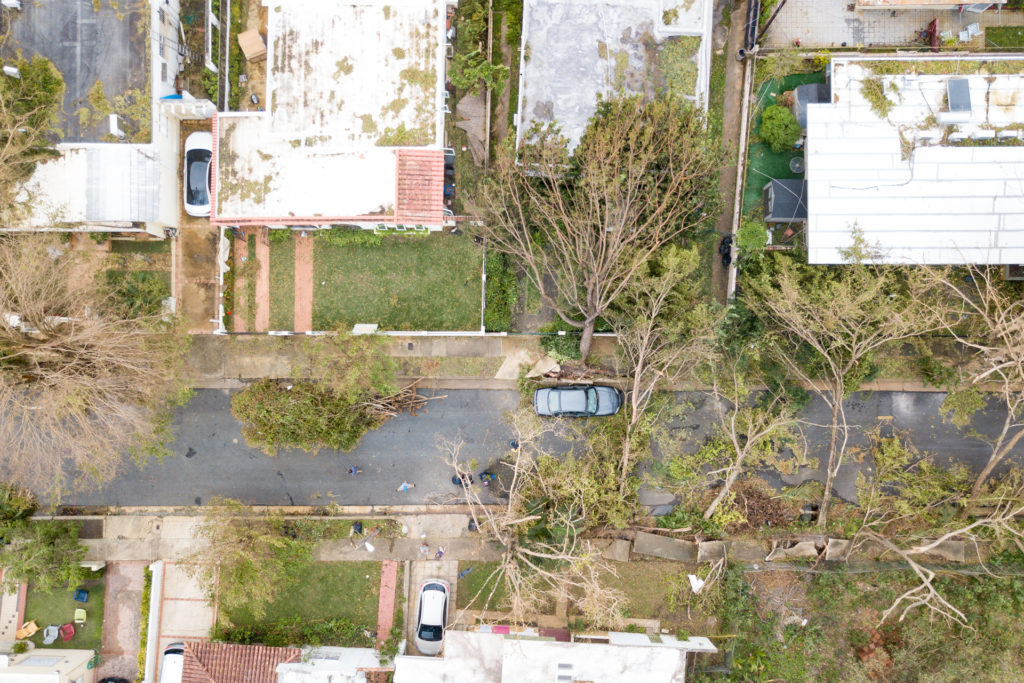
Meanwhile, law school clinics offer legal representation; FURIA and Ayuda Legal PR advocate for the rights of those affected by a lack of equitable and just housing; the Centro de Periodismo Investigativo keeps track of the use of recovery funds; and Proyecto Matria and Taller Salud insert gender perspective into the discussion.
To weave and to maximize efforts.
That’s the key.
“When people participate, the danger of improvising disappears, and one goes directly to what is needed. Participation goes beyond dollars and cents, it implies saving lives.”
- Carmen Villanueva Castro, FURIA Tweet
The structure that governs the process
FEMA
HUD
Eliminate discriminatory barriers, only applicable to Puerto Rico, that make it harder to access recovery and mitigation funds.
In the CDBG-DR funds grant agreement B-18-DP-72-0001, the FR-6190-N-04-CDBG-MIT and the Manual Drawdown Process for the Commonwealth of Puerto Rico, HUD and FEMA issued a series of norms, applicable only to Puerto Rico, that complicate management of funds and add layers of bureaucracy and overregulation. For example, HUD demands a certification issued by the Financial Oversight and Management Board for Puerto Rico before disbursing obligated funds. Public Law 116-20 conditions CDBG-MIT funds to an agreement between Puerto Rico and FEMA over the fixed estimated costs for critical infrastructure projects. Such estimates must be certified by FEMA contractors, resulting in a long and expensive process.Puerto Rico Planning Board
Government Agencies And Municipalities Managing Recovery Funds
Define a coherent and transparent framework for action and decision-making under a clear vision focused on sustainable development and equity, and in compliance with current land use planning.
The skein of concurring and disarticulated planning processes, each one responding to dissimilar requisites and to different scales, contributes to confusing and opaque decision-making processes, and dilutes citizen participation. In the absence of clear direction, the opportunities brought by recovery and tax incentive programs are lost, resulting in contradictory actions that favor private interests and promote displacement. The government of Puerto Rico has placed recovery planning processes in the hands of foreign companies, resulting in a dislocation between the proposals and reality.
Actions to be taken:
PRDOH
COR3
Fiscal Oversight and Management Board
Decentralize management of recovery funds so that municipalities and social organizations can have a larger role, and their implementation may be quick, participative and contextualized. Strengthen the infrastructure of these entities so they are able to participate.
FEMA
HUD
PRDOH
COR3
Promote local contracting by restructuring project scales so that local businesses and social organizations have real participation opportunities.
According to the Centro de Periodismo Investigativo (2019), only two of the twenty companies with the largest amount of construction contracts awarded since 2017 are local. External contracting prevents recovery investments from benefiting the local economy.
Actions to be taken:
The federal government must:
The government of Puerto Rico must:
The requested services are so generalized, and the money source so centralized, that construction and design services can not be quoted in a cost-effective way. Solutions to reconstruction should not be centralized. As in every good design, one must contextualize to respond to particular situations. Because of this, control over recovery plans has to be decentralized.”
- Cristina Algaze Beato, Arquitecta Tweet
Citizen participation: A people’s agenda
FEMA
HUD
COR3
Agencies
Municipalities And Organizations Managing Funds
Guarantee citizen participation in an equitable, real and timely way throughout the entire process.
There are formal mechanisms of limited participation such as public hearings, working committees, meetings with social organizations and letters of intent. These are not robust enough methods to promote and allow citizen participation in an informed, broad, effective and timely way. Broader participation is needed in the making of public policy at a municipal and national level.
The existing processes rely on individual initiatives and do not encourage community organization. Community planning has been structured as a parallel process, separated from the rest of the programs and its antecedents, with no impact in the use of recovery and mitigation funds.
In the case of CDBG-DR/MIT funds, and thanks to the work done by social organizations, the federal government enacted norms that demand the restructuring of participative processes. It is urgent for the Puerto Rico Housing Department to transcend previous practices and internalize that citizen participation is not an obstacle but a vehicle to ensure just recovery and equity.
Actions to be taken:
Congress
Create an independent workgroup of selected citizens in Puerto Rico that includes representation from the most vulnerable sectors of society with power to oversee that assigned funds are used with transparency, diligence and citizen participation, consistent with just recovery.
FEMA
HUD
PRDOH
COR3
Puerto Rico Institute Of Statistics
Improve access to data and information from local and federal agencies so that organizations and communities can oversee processes.
Although there are various internet portals with data, information is not centralized, organized, updated, nor presented in a clear and accessible way. There are discrepancies among available data in official web pages.Actions to be taken:
Dignified housing: Affordability, property and the right to decide
FEMA
HUD
PRDOH
COR3
Prioritize risk mitigation and avoid unnecessary displacements, protecting the rights of families to decide. Redesign programs focused on individuals, that do not take into account community impact.
Puerto Rico is the only place in the United States and its territories where home reconstruction is forbidden in zones with flood or landslide risk, even when mitigation is possible. Families are forced to decide between staying in their communities without receiving aid or moving to a safe housing unit in another place. This breaks the social fiber and generates problems in the community, such as vacant unmaintained spaces.Actions to be taken:
FEMA
HUD
PRDOH
COR3
Leverage projects based on citizen participation, self-agency and self-help originating from within the communities, instead of avoiding them.
Communities and social organizations have worked out many solutions to the housing crisis. The building of roofs and homes by community members and volunteers has become a solution. Instead of backing these initiatives with technical support and financing, barriers are put up. Since before Maria, Puerto Rico has had risk mitigation projects based on principles of equity and justice, with citizen participation, including some with international prestige such as the Proyecto ENLACE del Caño Martín Peña. Community aqueducts, microgrids and energy cooperatives, community gardens, among others, are fundamental elements of dignified housing. Recovery funds present a unique opportunity to encourage these initiatives and show results.
FEMA
HUD
PRDOH
COR3
LEGISLATURE
Acknowledge the rights of good faith tenants and property owners with or without legal documents (but with registered assets in Puerto Rico’s Property Registry). Promote tenancy security, and strengthen and protect tenants’ rights.
After Maria, dozens of thousands of families have been denied aid due to a lack of recognition, by the Federal government, of Puerto Rico’s legal framework on homeowner and occupation rights. Many tenants are still living under a blue roof and landlords are still charging the same rent without having made repairs.
FEMA
HUD
PRDOH
COR3
Integrate services in a coherent and accessible way, with clear, simple, unduplicated applications, available on multiple platforms. Support and keep applicants informed throughout the process and educate people about their rights.
Prioritize the most vulnerable people and communities. Urgently address the housing situation of communities affected by seismic events.
Government of Puerto Rico
Municipalities
Provide options for citizens not eligible for federally financed projects.
In the housing sphere, recovery programs tend to exclude undocumented immigrants, homeless people, undocumented good faith homeowners and tenants, among other groups. For those tired of waiting for official programs, rescuing vacant properties has become an option.Actions to be taken:
“In the case of the undocumented immigrant community, it has been an uphill battle. They don't qualify. Funds are very restricted and that community doesn't have access.” Romelinda Grullón Miguel, Centro de la Mujer Dominicana
- Romelinda Grullón Miguel, Centro de la Mujer Dominicana Tweet
Foundations can support what is being done
After hurricanes Irma and Maria, many US-based foundations and nonprofit organizations got closer to Puerto Rico, leaving a footprint in the recovery process.
Experiences are diverse. While some of them leveraged local initiatives with solid or emerging track records, others invested resources in financing external structures with little local impact. Puerto Rico foundations enhanced and expanded their work. Appetite has grown to support those promoting community organization and empowerment, and advocating for a transformative agenda of equity and justice.
Social organizations have identified various opportunities so that philanthropic investment promotes a just recovery.
Research, pilot project development, public policy analysis and policy making, and information dissemination.
Long-term initiatives, not just short-term individual projects
Popular education, capacity building and community organizing.
Political activism and advocacy in favor of a just recovery
Oversight of the use of recovery funds and legal actions in processes where public officials, agencies and organizations have defaulted.
The work of special coalitions and networks
Initiatives to grant access to dignified housing for populations that do not qualify for government programs
Initiatives from community-based and mutual support groups not receiving aid from governmental programs.
A revolving fund for social organizations interested in managing CDBG-DR/MIT funds, but do not have the economic capacity to finance investments and operate through reimbursements.
Organizations that receive funds, so they can have the structure required to ensure their work promotes citizen participation and just recovery, and make sure their actions are aligned with such principles
The support gap between organizations in the educational and cultural fields, and those working on housing and environmental issues.
Local organizations' initiatives.
I never thought that I would be able to repair my home because what FEMA gave me was not even enough for the roof. Meeting you was a miracle from God.”
- Aida Alfonso. Ponce, Puerto Rico Tweet
This document is the first in a series focused on showing the state of the country from social organizations’ perspective, to give visibility to their demands. The content is the result of a working session that took place on August 20, 2020.
Participants
Centro de la Mujer Dominicana | Centro para una Nueva Economía | Centro para la Reconstrucción del Hábitat | Coalición de Coaliciones pro Personas Sin Hogar de Puerto Rico | Fideicomiso de la Tierra del Caño Martín Peña | Firmes Unidos y Resilientes con la Abogacía | Primera Iglesia Bautista de Río Piedras | PathStone Corporation | Fundación Fondo de Acceso a la Justicia | Cristina Algaze Beato | Pedro Cardona Roig
General Coordination
Filantropía Puerto Rico and its Housing Action Dialogue, composed of: Amplify Fund, Neighborhood Funders Group | Hispanic Federation | Fundación Comunitaria de Puerto Rico | Fundación Segarra Boerman e Hijos | Fundación Titín | Oxfam America | The Ford Foundation
Session design and facilitation: elenjambre | Rapporteur: Ysatis Santiago | Drafting: elenjambre | Editing: Margarita Morales | Graphic design and layout: estudio interlínea
Filantropía Puerto Rico
Connects philanthropic entities to amplify their voice and impact in areas of equity, collaboration, transparency and social justice. Its Housing Action Dialogue commissioned this document. Action Dialogues are working groups formed by members of Filantropía Puerto Rico to explore topics of interest and coordinate actions that result in higher impact.

